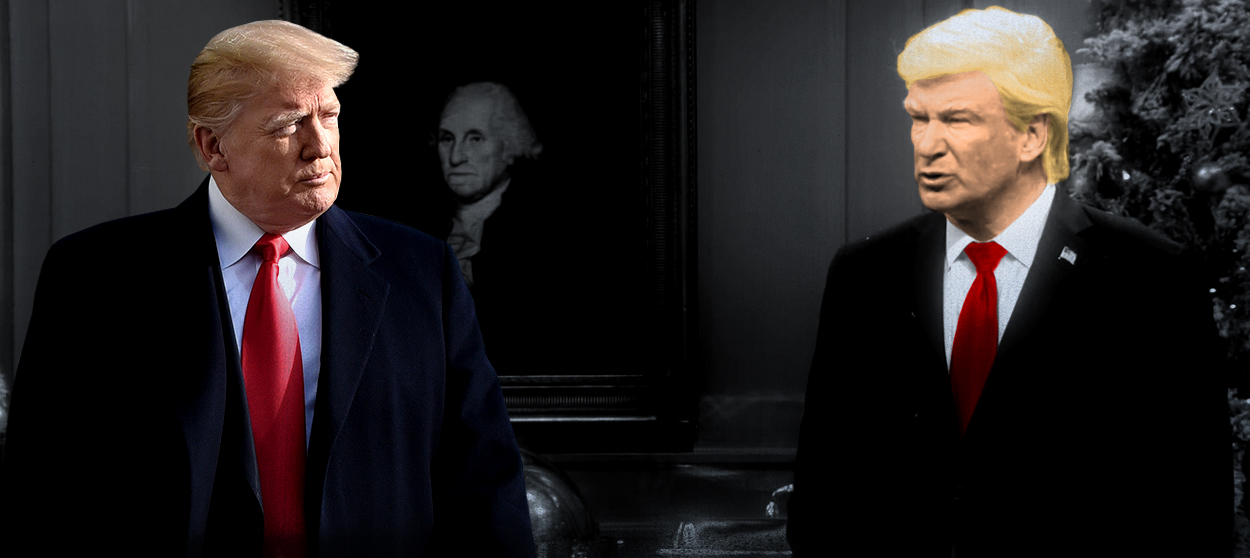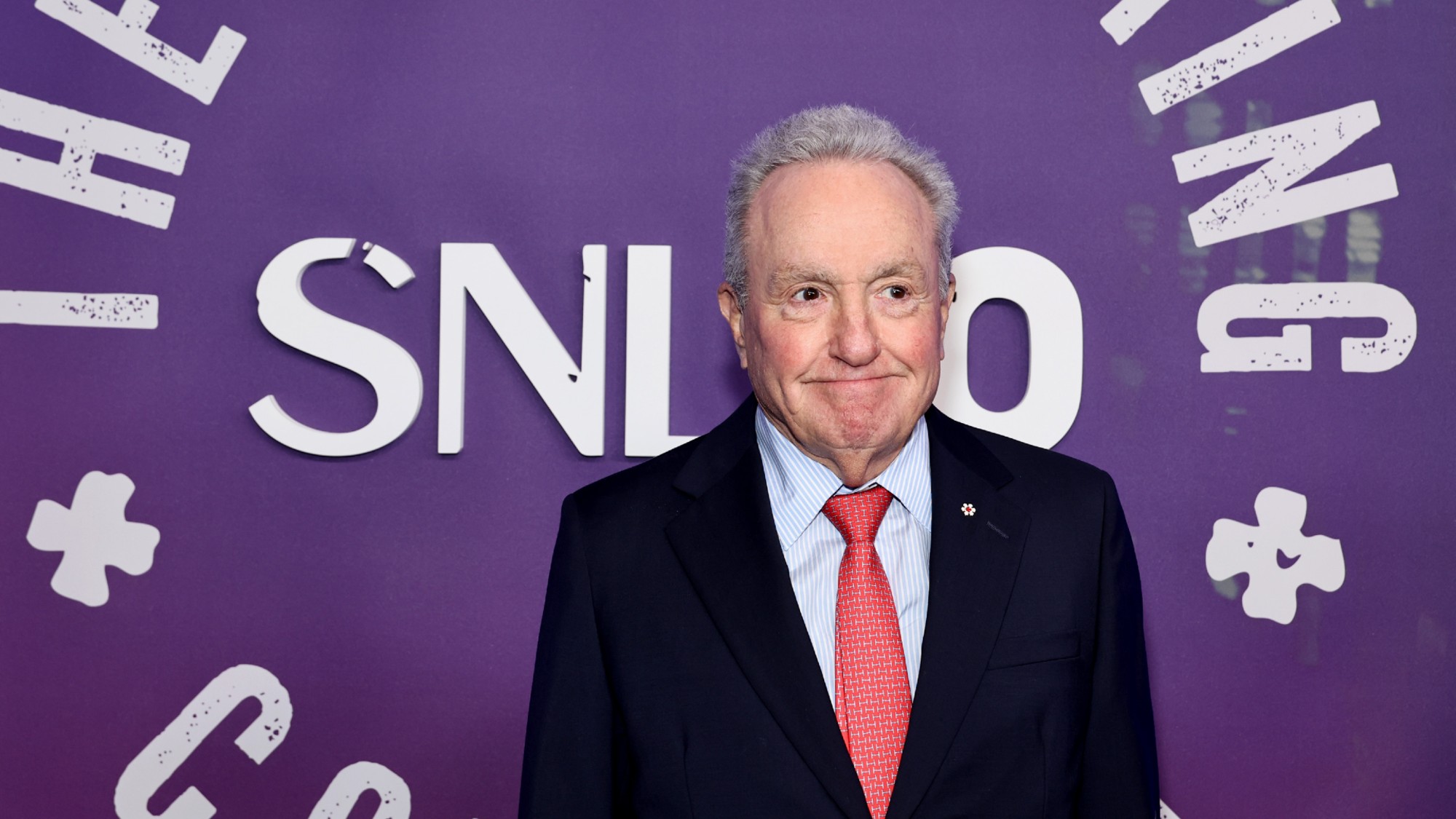Why Trump's attacks on SNL are seriously dangerous
The president is threatening to use the government to punish protected speech. That's a red flag.


A free daily email with the biggest news stories of the day – and the best features from TheWeek.com
You are now subscribed
Your newsletter sign-up was successful
A confession: I can barely watch the political cold opens to Saturday Night Live anymore. Some people don't like them because they think the show's critique of President Trump is toothless, but I find the political sketches mostly tedious and unfunny. Give me a thousand sketches about the rock band Weezer before I have to watch Alec Baldwin wear a wig and pinch his lips again. It would be nice, at long last, to move on.
That said, in a fight between Trump and SNL, it's much easier to root for SNL.
The president, once again, is griping about being made fun of by a comedy show. On Sunday, after SNL ran an It's a Wonderful Life parody about the Trump administration, the president woke up and began complaining on Twitter.
The Week
Escape your echo chamber. Get the facts behind the news, plus analysis from multiple perspectives.

Sign up for The Week's Free Newsletters
From our morning news briefing to a weekly Good News Newsletter, get the best of The Week delivered directly to your inbox.
From our morning news briefing to a weekly Good News Newsletter, get the best of The Week delivered directly to your inbox.
Now, mostly this is ridiculous. For more than 40 years, the worlds of politics and pop culture have had a deal: Politics provides the president, and pop culture makes fun of that president. So SNL portrayed Gerald Ford as catastrophically clumsy, George W. Bush as an idiot manchild, and George H.W. Bush as barely verbal.
Trump, who apparently sees conspiracies everywhere, regards this process as unfair. One wishes he'd spend his Saturday nights watching nature documentaries, instead.
But Trump's criticism of the show is also kind of scary.
Politicians have been thin-skinned in the face of comedic criticism before. The elder Bush famously held a grudge against Doonesbury cartoonist Garry Trudeau after that comic depicted him having his "manhood placed in a blind trust." Bush, however, never did what Trump implicitly did on Sunday, which is threaten to use the resources of government to punish the maker of the satire.
A free daily email with the biggest news stories of the day – and the best features from TheWeek.com
In other words, because Trump has a deep psychological fear of being laughed at, he wants to make it illegal to hurt his feelings.
"Should be tested in courts, can't be legal?" Trump wrote. "Only defame & belittle! Collusion?"
It's unlikely much will come of Trump's musings. The president often threatens to sue his critics, and just as often nothing comes of it. More importantly, the United States Constitution has a First Amendment that guarantees freedom of expression — and which was pretty much created for the purpose of letting Americans criticize their leaders. And the courts have done plenty over the last century to shape First Amendment law: We know that to prove defamation, for example, a public figure like Trump would have to meet a high standard. The Supreme Court in 1988 wouldn't let Jerry Falwell sue Hustler magazine for portraying him as an incestous drunk in a parody; today's court may be more conservative, but it's not likely to let a legal challenge to a satirical show like SNL get very far, either.
So why sweat it?
Because it's wrong — and anti-Constitutional — for a president to threaten to use government to punish protected speech. Period. Even if the president's threats amount to nothing, individuals and companies fear the government's awesome power enough that they might decide poking fun at the president isn't worth the risk: When a president threatens censorship — and that's precisely what Trump is doing — the chances of self-censorship go up. The president is trying to bully a notable critic into silence: NBC and Saturday Night Live can probably take the pressure, but what about an individual or a publication that doesn't have access to the same powerful lawyers and deep pockets?
The First Amendment sometimes feels fragile because it's so often used to defend unpopular speech. Who really wants to be on the side of Larry Flynt or Fred Phelps? The administration went after Jim Acosta a few weeks ago not just because White House officials dislike the CNN correspondent, but because they knew Acosta's occasional grandstanding can make other journalists uncomfortable — the administration wanted to see if it could divide the press corps into journalists more and less deserving of First Amendment protections. That's why Trump targets SNL now: If you're not a fan, maybe you want to shrug and wait for a more noble cause to come along. By then, though, it might be too late. Better to push back now instead of waiting for real damage to be done.
So yes, the president's threat matters. It isn't the worst thing Trump tweeted this weekend: He also called his former lawyer a "rat" for cooperating with the government, and suggested he'd intervene in the case of a Green Beret accused of killing a prisoner suspected of terrorism. Taken together with the SNL threat, the tweets confirmed what we already know about Trump: He's lawless and petty, a narcissist with autocratic tendencies.
Which means, for now, Alec Baldwin's ridiculous Trump wig might as well be a banner for freedom. May it ever fly proud and high.
Joel Mathis is a writer with 30 years of newspaper and online journalism experience. His work also regularly appears in National Geographic and The Kansas City Star. His awards include best online commentary at the Online News Association and (twice) at the City and Regional Magazine Association.
-
 The ‘ravenous’ demand for Cornish minerals
The ‘ravenous’ demand for Cornish mineralsUnder the Radar Growing need for critical minerals to power tech has intensified ‘appetite’ for lithium, which could be a ‘huge boon’ for local economy
-
 Why are election experts taking Trump’s midterm threats seriously?
Why are election experts taking Trump’s midterm threats seriously?IN THE SPOTLIGHT As the president muses about polling place deployments and a centralized electoral system aimed at one-party control, lawmakers are taking this administration at its word
-
 ‘Restaurateurs have become millionaires’
‘Restaurateurs have become millionaires’Instant Opinion Opinion, comment and editorials of the day
-
 The billionaires’ wealth tax: a catastrophe for California?
The billionaires’ wealth tax: a catastrophe for California?Talking Point Peter Thiel and Larry Page preparing to change state residency
-
 Bari Weiss’ ‘60 Minutes’ scandal is about more than one report
Bari Weiss’ ‘60 Minutes’ scandal is about more than one reportIN THE SPOTLIGHT By blocking an approved segment on a controversial prison holding US deportees in El Salvador, the editor-in-chief of CBS News has become the main story
-
 Has Zohran Mamdani shown the Democrats how to win again?
Has Zohran Mamdani shown the Democrats how to win again?Today’s Big Question New York City mayoral election touted as victory for left-wing populists but moderate centrist wins elsewhere present more complex path for Democratic Party
-
 Millions turn out for anti-Trump ‘No Kings’ rallies
Millions turn out for anti-Trump ‘No Kings’ ralliesSpeed Read An estimated 7 million people participated, 2 million more than at the first ‘No Kings’ protest in June
-
 ‘The problem isn’t solved by simply swapping out the faces on screen’
‘The problem isn’t solved by simply swapping out the faces on screen’Instant Opinion Opinion, comment and editorials of the day
-
 Ghislaine Maxwell: angling for a Trump pardon
Ghislaine Maxwell: angling for a Trump pardonTalking Point Convicted sex trafficker's testimony could shed new light on president's links to Jeffrey Epstein
-
 The last words and final moments of 40 presidents
The last words and final moments of 40 presidentsThe Explainer Some are eloquent quotes worthy of the holders of the highest office in the nation, and others... aren't
-
 The JFK files: the truth at last?
The JFK files: the truth at last?In The Spotlight More than 64,000 previously classified documents relating the 1963 assassination of John F. Kennedy have been released by the Trump administration
